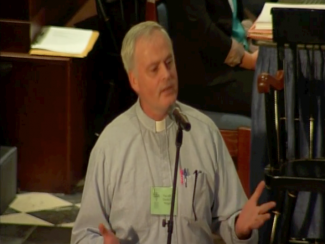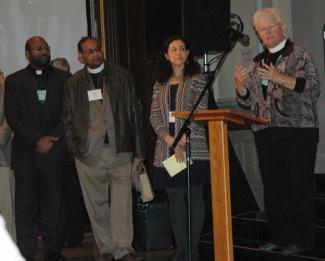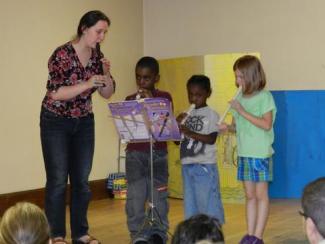For some, the word “mission” might evoke traveling to the other side of the world. But many communities in the diocese are answering the call to mission right in their own neighborhoods, supported by funds from the Together Now campaign. Two new mission hubs were announced at the 2013 Diocesan Convention on Nov. 2: one for Plymouth, the Cape and the islands, and one for the Merrimack Valley.They join the South Coast Mission Hub, the “pilot” hub, which has just completed its first year of serving Fall River, New Bedford, and the surrounding communities.
A mission hub is a collaboration among three or more parishes and community organizations that come together to discern the particular needs and special resources in their communities, and then work collectively to have an impact. According to the Rev. Samuel Rodman, Project Manager for Campaign Initiatives, mission enriches everyone involved. Communities are nourished by the work and resources of the church, while the church strengthens its relationship with the community—the key, Rodman said, to long-term sustainability.
“Part of our mission as a diocese is to encourage reaching beyond the church,” Rodman said.
Churches are able to accomplish much more when they work together, pooling resources, talents and funds.
“The byproduct, or the gift, is when a congregation partners with others and they learn what they do well and what they might be doing more effectively…there’s a lot of cross pollination that happens from the work.”
Investing in the gateway cities
The Merrimack Valley Hub, encompassing Haverhill, Lawrence and Lowell, will be focused on providing afterschool programming for children. The hub has a special focus on music and arts education, but sites will also provide mentoring and homework help.
The Rev. Jane Bearden, Rector of Trinity Church in Haverhill, said that it just makes sense for these communities to work together.
“Lowell, Lawrence and Haverhill all have immigrant population arriving and are facing many of the same problems,” she said. “[All of these churches] have a large physical plant and small, changing congregations, and all have an interest in working with kids in our neighborhoods,” she said.
These three cities are known as gateway cities: highly diverse mid-size urban centers with large immigrant populations and a host of stubborn social and economic challenges. Lilli Leggio, Director of Communications and Outreach at Esperanza Academy and a volunteer with the ACAT program, said that although the challenges of these communities can seem daunting, it is a Christian imperative to work towards justice.
“As champions of social justice in our Episcopal organizations, it is our duty and privilege to share God's abundance,” she said. “What we envision [for the hub] is creating sanctuaries of hope and opportunity for the children and families in our communities.”
The Merrimack Valley Hub has two strong models already in its midst: the ACAT program at Trinity in Haverhill and Esperanza Academy in Lawrence, an independent school in the Episcopal tradition for middle school-age girls. The ACAT (Academy of Creative Arts at Trinity) program is currently a weekly program providing music education and other creative activities for children ages 6-12. There are currently 35 children enrolled, although Bearden noted that the program is only funded for 20.
The mission hub will expand ACAT to five days a week, start an elementary program at Grace Church in Lawrence and expand afterschool programs at St. Anne’s Church and St. John’s Church in Lowell. Bearden said that the plan is to have all of these programs launch in September 2014. Bearden said that she anticipates the Lowell programs will be divided between parishes, with programming at each site two or three days a week.
Leggio said that one of the most beneficial elements of becoming a hub is that all of these programs will have a supportive network for sharing both their struggles and triumphs.
“If our program comes up with an idea for doing something that could be replicated, that’s going to make things a lot easier than needing to reinvent the wheel,” she said. “We’re going to have a network for sharing best practices.”
Working together as a hub also has financial significance, allowing offerings that individual sites would be unlikely to be able to afford alone. For example, part of the hub’s plan is to hire a social worker who will serve children and families in all three communities.
“A social worker at an individual program would be a luxury we could not afford alone, but when we pool our resources we’re able to make that possible,” said Leggio.
Now that the hub has been officially announced, work is ramping up. According to Bearden, the first step is forming an advisory committee and creating subcommittees with members who have expertise in child development. These subcommittees will work on curriculum development. Additionally, delegates from each parish will meet to discuss how they can best use the mission hub to develop community.
“We see this as an incredible opportunity to bring each community together,” Leggio said. “We’re going to be there for support and encouragement, and [the hub] will be a place for problems and successes to be shared.”
Bearden said that the mission hub will be a way for churches to engage with their communities, and to start a conversation about how to stop violence at its roots.
“I believe with all my heart that the causes of violence in our society are poverty and inequity,” Bearden said. “This is a way for a small church to engage in active community building and interrupt the cycle of violence, not just as a Band-Aid but going to the source… We are going to the source, raising up a group of kids by giving them access to the knowledge and skills they need to be productive students and giving them a different way to deal with the struggles they face every day.”
Lilli Leggio says that she hopes these programs can offer something desperately needed in the gateway cities: hope.
“There is great need, a hunger, in Lowell, Lawrence and Haverhill, for hope,” Leggio said. “We believe our children are our greatest resource and source for renewal.”
Listening to the community
The Plymouth, Cape and Islands Mission Hub has a twofold mission: to care for people who are without community, and to care for God’s creation. But their journey to becoming a mission hub began by asking the question: what does mission mean to us?
“Outreach proceeds from the idea that parishes have something—money, people—to give, and invite people to come to us, allowing us to be places where charity or empowerment is offered. The difference between outreach and mission is that in mission you equip people to go out beyond the boundaries of the church, to reach those people who wouldn’t come to the church,” said Deacon Helen Trainor of Christ Church in Plymouth.
Mission, Trainor said, is about listening to communities in need and building relationships that nourish everyone involved.
“Mission is about building relationships, about mutuality–empowering people through God’s love, rather than giving them charity,” Trainor said. “It’s not about our largesse coming to them, it’s theirs coming to us—us learning a language and creating those relationships that don’t exist. Churches have to ask, ‘what do we have to offer that no one else has?’ And that comes down to God-centered relationships.”
Once there was a common embrace of what mission is, the parishes of the potential hub embarked on a period of listening and discernment, to understand and define the passions of each community. Deacons Helen Trainor and Dan Horgan and retired bishop suffragan Bud Cederholm all spent time preaching and listening to parishes, and defining the passions of each community.
Through listening to the groups, the hub found that parishioners found they were equally passionate about all groups of people who may feel isolated: the elderly, LGBTQ youth, returning veterans, migrant workers and others. Many parishioners were vocal that they did not want to exclude any group from this work of extending mission to anyone who may feel loneliness in society. The hub leaders determined that they would not choose a single group to focus on, but rather work on developing a plan to equip people for sustained mission with people from all walks of life.
“The skill-set being developed will sustain mission with many different groups of people,” said Trainor.
The hub has established a plan for providing learning that is partially general, and partially specific to a group. The first area where the hub is providing particularized learning is for mission to the elderly. A group of 10 from the upper Cape will be the first cohort to take this training, and will begin mission work at nursing homes, assisted living facilities and other locations within the hub’s geographic reach.
“The shape of each mission will be defined by what the community tells us they need, and what the elderly have told us that they need is someone to listen to their stories,” Trainor said. “The question that the elderly have is ‘did my life matter?’ We are teaching people the difference between hearing and listening, helping them to be a quiet, centered, godly presence for these elderly people.”
The training will also prepare people to talk about religion with the elderly.
“The questions the elderly have are often things like, where was God when my child died? Where will God be when I die? We want people to be able to answer those questions, and of course to do that you have to know what you believe and you have to be comfortable talking about your faith and your faith journey.”
Uniting together in this new way will be crucial to the 18 small churches of the hub. The churches are scattered from Wareham to Provincetown to Nantucket, and many parishes are isolated from one another simply by distance. Many are located in vacation areas, and see their attendance fluctuate throughout the year. Having an organized community for support and prayer will make the work of mission stronger and more sustainable in the long run, Trainor said.
“In order to sustain mission, you need to be serious about equipping people for mission,” she said. “Small congregations do not have the capacity to provide that in-depth training on their own, so it has to be done as a collective effort.”
Forming the hub will provide that much-needed support network, something that these small parishes would not have the capacity to provide on their own.
“If we can’t call upon the resources of all the parishes, we won’t be able to build and sustain that community,” Trainor said.
Most importantly, the people enacting mission in the hub will have the support of the entire network, a community where they can recharge, share their successes and struggles and pray together.
“Jesus understood that mission is exhausting,” said Trainor, “and that it takes courage to go where other people are, as opposed to having them come to you—think of being in a jail cell, a nursing home, or a Headstart program—and you can’t do that without a strong community to come back to, that will support you and pray over you.”
Spiritually, organizationally and financially, churches in the new hubs will be able to learn from one another and work towards mission that is sustainable in the long term. Both hubs are already hard at work forming committees, organizing trainings and planning for the future.
“Statistics show that churches that are engaged with mission are churches that grow,” said Rodman. “And to do [mission] well, over a sustained period, churches need the resources, gifts and talents of more than one congregation.”
The next round of mission hub applications will begin in February 2014. Congregations interested in beginning the mission hub discernment and application process can visit the Mission Hubs page for documents and more information.
--Ellen Stuart



